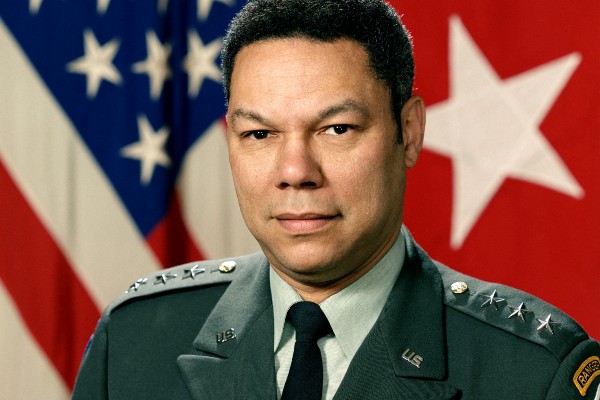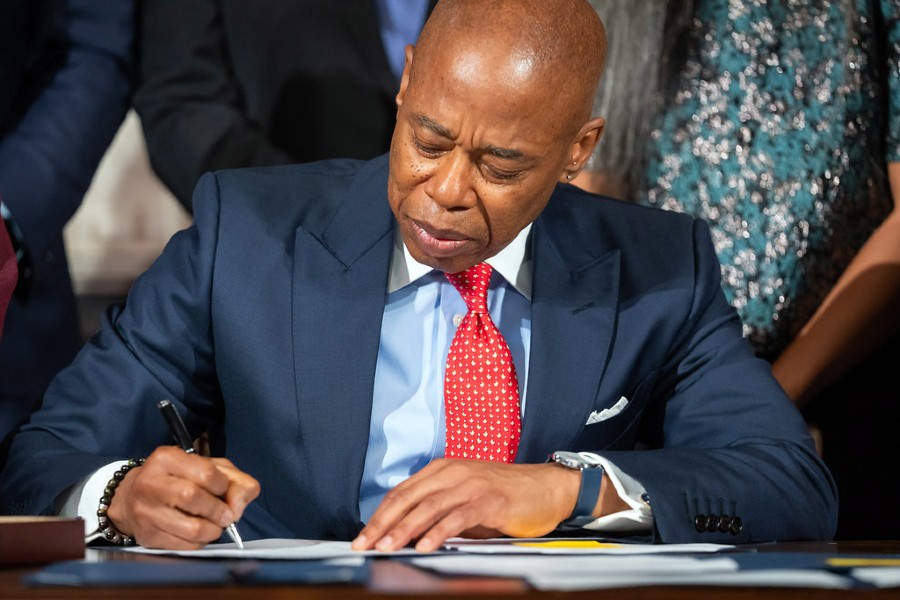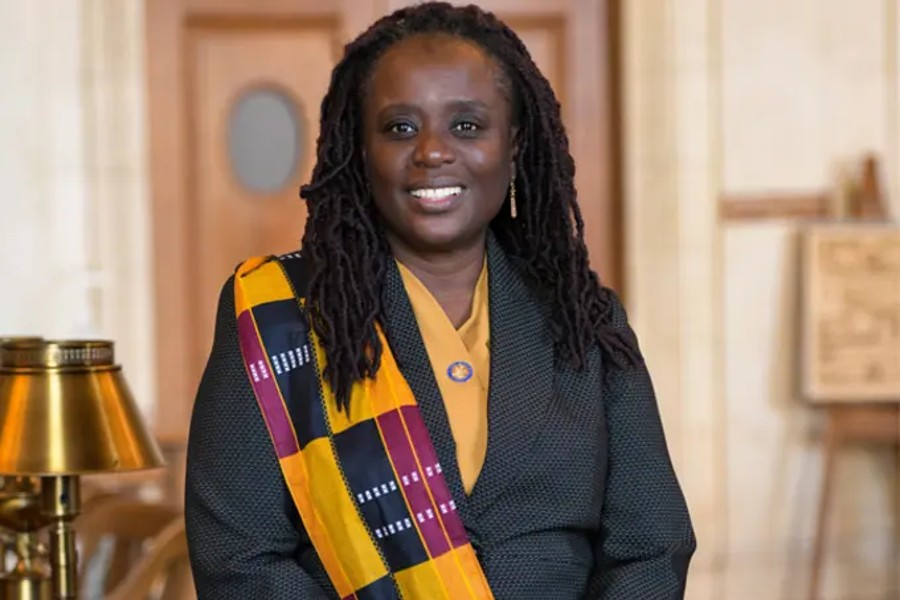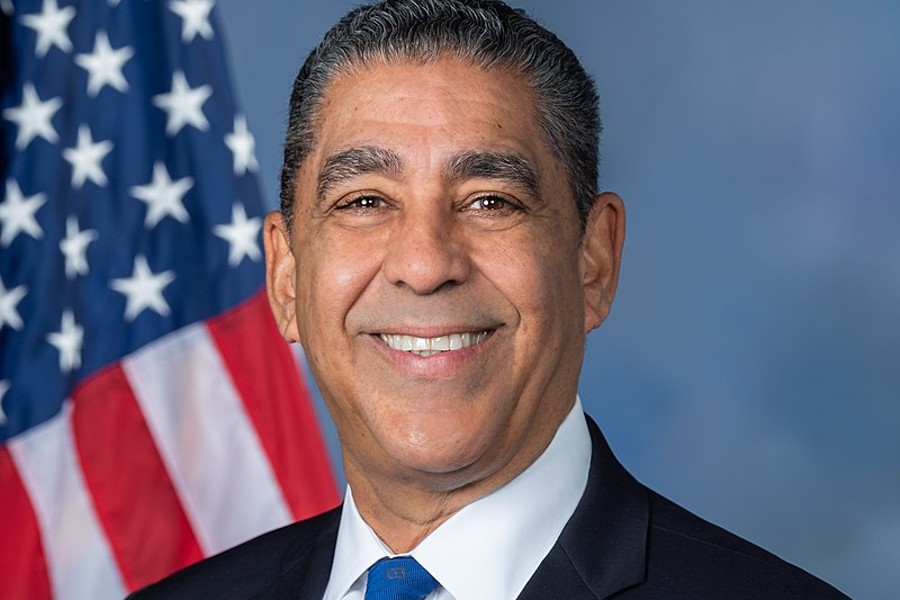 Colin Luther Powell, April 5, 1937 – October 18, 2021, was an Harlemite politician, diplomat, statesman, and four-star general who served as the 65th United States secretary of state from 2001 to 2005.
Colin Luther Powell, April 5, 1937 – October 18, 2021, was an Harlemite politician, diplomat, statesman, and four-star general who served as the 65th United States secretary of state from 2001 to 2005.
He was the first African-American secretary of state.
Prior to the election of Barack Obama as president in 2008, he and his successor, Condoleezza Rice, were the highest-ranking African Americans in federal executive branch history (by virtue of the secretary of state standing fourth in the presidential line of succession). He served as the 16th United States national security advisor from 1987 to 1989 and as the 12th chairman of the Joint Chiefs of Staff from 1989 to 1993.
Powell was born in New York City in 1937 and was raised in the South Bronx. His parents, Luther and Maud Powell, immigrated to the United States from Jamaica. He was educated in the New York City public schools, graduating from the City College of New York (CCNY), where he earned a bachelor’s degree in geology. He also participated in ROTC at CCNY and received a commission as an Army second lieutenant upon graduation in June 1958. He was a professional soldier for 35 years, during which time he held many command and staff positions and rose to the rank of four-star general. He was Commander of the U.S. Army Forces Command in 1989.
Powell’s last assignment, from October 1989 to September 1993, was as the 12th chairman of the Joint Chiefs of Staff, the highest military position in the Department of Defense. During this time, he oversaw 28 crises, including the invasion of Panama in 1989 and Operation Desert Storm in the Persian Gulf War against Iraq in 1990–1991. He formulated the Powell Doctrine which limits American military action unless it satisfies criteria regarding American national security interests, overwhelming force, and widespread public support.
He was the 65th United States secretary of state, serving under Republican President George W. Bush. His term was highly controversial regarding his inaccurate justification for America’s Iraq War in 2003. He was forced to resign after Bush was reelected in 2004.
In 1995, Powell wrote his autobiography, My American Journey, and then in retirement another book, It Worked for Me, Lessons in Life and Leadership (2012). He pursued a career as a public speaker, addressing audiences across the country and abroad. Prior to his appointment as Secretary of State, Powell was the chairman of America’s Promise – The Alliance for Youth, a national nonprofit organization dedicated to mobilizing people from every sector of American life to build the character and competence of young people. He won numerous U.S. and foreign military awards and decorations. His civilian awards included the Presidential Medal of Freedom (twice), the Congressional Gold Medal, the Presidential Citizens Medal, the Secretary of State Distinguished Service Medal, and the Secretary of Energy Distinguished Service Medal. Several schools and other institutions were named in his honor, and he held honorary degrees from universities and colleges across the country. In 2016, while not a candidate for that year’s election, he received three electoral votes from Washington for the office of President of the United States.
Powell, who was being treated for blood cancer, died from complications of COVID-19 on October 18, 2021.
Early life and education
Colin Luther Powell was born on April 5, 1937, in Harlem, a neighborhood in the New York City borough of Manhattan, to Jamaican immigrants, Maud Ariel (née McKoy) and Luther Theophilus Powell. His parents were both of mixed African and Scottish ancestry. Luther worked as a shipping clerk and Maud as a seamstress. Powell was raised in the South Bronx and attended the now closed Morris High School, from which he graduated in 1954.
While at school, Powell worked at a local baby furniture store, where he picked up Yiddish from the Eastern European Jewish shopkeepers and some of the customers.(He once spoke to a Jewish reporter in Yiddish, much to the man’s surprise.) He also served as a Shabbos goy, helping Orthodox families with needed tasks on the Sabbath. He received a Bachelor of Science degree in Geology from the City College of New York in 1958 and said that he was a “C average” student. Powell also graduated from George Washington University with an MBA in 1971 and a Honorary Doctor of Public Service in 1990.
Despite his parents’ pronunciation of his name as /ˈkɒlɪn/ (KOLL-in), Powell pronounced his name /ˈkoʊlɪn/ (KOHL-in) from childhood on after the World War II flyer Colin P. Kelly Jr. Radio and television reporters have used Powell’s preferred pronunciation.
Military career
Powell was a professional soldier for 35 years, holding a variety of command and staff positions and rising to the rank of general.
Training
While attending the City College of New York, Powell joined the Reserve Officers’ Training Corps (ROTC). He described the experience as one of the happiest experiences of his life. According to Powell:
It was only once I was in college, about six months into college when I found something that I liked, and that was ROTC, Reserve Officer Training Corps in the military. And I not only liked it, but I was pretty good at it. That’s what you really have to look for in life, something that you like, and something that you think you’re pretty good at. And if you can put those two things together, then you’re on the right track, and just drive on.
Cadet Powell joined the Pershing Rifles, the ROTC fraternal organization and drill team begun by General John Pershing.
Upon graduation, he received a commission as an Army second lieutenant; at this time, the Army was newly desegregated[8] (see: Executive Order 9981). He underwent training in the state of Georgia, where he was refused service in bars and restaurants because of the color of his skin.
After attending basic training at Fort Benning, Powell was assigned to the 48th Infantry, in West Germany, as a platoon leader.
Vietnam War
Captain Powell served a tour in Vietnam as a South Vietnamese Army (ARVN) advisor from 1962 to 1963. While on patrol in a Viet Cong-held area, he was wounded by stepping on a punji stake.
The large infection made it difficult for him to walk, and caused his foot to swell for a short time, shortening his first tour.[citation needed]
Powell returned to Vietnam as a major in 1968, serving as assistant chief of staff of operations for the 23rd (Americal) Infantry Division. During the second tour in Vietnam he was decorated with the Soldier’s Medal for bravery after he survived a helicopter crash and single-handedly rescued three others, including division commander Major General Charles M. Gettys, from the burning wreckage.
Powell was charged with investigating a detailed letter by 11th Light Infantry Brigade soldier Tom Glen, which backed up rumored allegations of the My Lai Massacre. He wrote: “In direct refutation of this portrayal is the fact that relations between American soldiers and the Vietnamese people are excellent.” Later, Powell’s assessment would be described as whitewashing the news of the massacre, and questions would continue to remain undisclosed to the public. In May 2004, Powell said to television and radio host Larry King, “I was in a unit that was responsible for My Lai. I got there after My Lai happened. So, in war, these sorts of horrible things happen every now and again, but they are still to be deplored.”
After the Vietnam War
When he returned to the U.S. from Vietnam in 1971, Powell earned a Master of Business Administration from Georgetown University in Washington, D.C. He later served a White House Fellowship under President Richard Nixon from 1972 to 1973. During 1975–1976 he attended the National War College, Washington, D.C.
In his autobiography, My American Journey, Powell named several officers he served under who inspired and mentored him. As a lieutenant colonel serving in South Korea, Powell was very close to General Henry “Gunfighter” Emerson. Powell said he regarded Emerson as one of the most caring officers he ever met. Emerson insisted his troops train at night to fight a possible North Korean attack, and made them repeatedly watch the television film Brian’s Song to promote racial harmony. Powell always professed that what set Emerson apart was his great love of his soldiers and concern for their welfare. After a race riot occurred, in which African American soldiers almost killed a white officer, Powell was charged by Emerson to crack down on black militants; Powell’s efforts led to the discharge of one soldier, and other efforts to reduce racial tensions. During 1976–1977 he commanded the 2nd Brigade of the 101st Airborne Division.
National Security Advisor and other advisory roles
In the early 1980s, Powell served at Fort Carson, Colorado. After he left Fort Carson, Powell became senior military assistant to Secretary of Defense Caspar Weinberger, whom he assisted during the 1983 invasion of Grenada and the 1986 airstrike on Libya.
In 1986, Powell took over the command of V Corps in Frankfurt, Germany, from Robert Lewis “Sam” Wetzel. The next year, he served as United States Deputy National Security Advisor, under Frank Carlucci.
Following the Iran–Contra scandal, Powell became, at the age of 49, Ronald Reagan’s National Security Advisor, serving from 1987 to 1989 while retaining his Army commission as a lieutenant general. He helped negotiate a number of arms treaties with Mikhail Gorbachev, the leader of the Soviet Union.
In April 1989, after his tenure with the National Security Council, Powell was promoted to four-star general under President George H. W. Bush and briefly served as the Commander in Chief, Forces Command (FORSCOM), headquartered at Fort McPherson, Georgia, overseeing all Army, Army Reserve, and National Guard units in the Continental U.S., Alaska, Hawaii, and Puerto Rico. He became the third general since World War II to reach four-star rank without ever serving as a division commander, joining Dwight D. Eisenhower and Alexander Haig.
Later that year, President George H. W. Bush selected him as Chairman of the Joint Chiefs of Staff.
Chairman of the Joint Chiefs of Staff
Powell’s last military assignment, from October 1, 1989, to September 30, 1993, was as the 12th Chairman of the Joint Chiefs of Staff, the highest military position in the Department of Defense. At age 52, he became the youngest officer, and first Afro-Caribbean American, to serve in this position. Powell was also the first JCS Chair who received his commission through ROTC.[
During this time, he oversaw responses to 28 crises, including the invasion of Panama in 1989 to remove General Manuel Noriega from power and Operation Desert Storm in the 1991 Persin Gulf War. During these events, Powell earned the nickname “the reluctant warrior”—although Powell himself disputed this label, and spoke in favor of the first Bush administration’s Gulf War policies.
As a military strategist, Powell advocated an approach to military conflicts that maximizes the potential for success and minimizes casualties. A component of this approach is the use of overwhelming force, which he applied to Operation Desert Storm in 1991. His approach has been dubbed the Powell Doctrine.
Powell continued as chairman of the JCS into the Clinton presidency but as a dedicated realist, he considered himself a bad fit for an administration largely made up of liberal internationalists.
He clashed with then-U.S. ambassador to the United Nations Madeleine Albright over the Bosnian crisis, as he opposed any military interventions that didn’t involve U.S. interests.
Powell also regularly clashed with Secretary of Defense Leslie Aspin, whom he was initially hesitant to support after the latter was nominated by President Clinton.
At some point during a lunch-meeting between General Powell and Aspin for a preparation of Operation Gothic Serpent, while Powell was presenting what was needed to be prepared for the operations, Aspin was more focused on wolfing down his salad instead of listening and paying attention to Powell.
The incident caused Powell to grew more irritated towards the Defense Secretary and led to his early resignation on September 30, 1993. He was succeeded temporarily by Vice Chairman of the Joint Chiefs of Staff Admiral David E. Jeremiah, who took the position as Acting Chairman of the Joint Chiefs of Staff. Indeed, soon after Powell’s resignation, on 3–4 October 1993 the Battle of Mogadishu as part of the Operation Gothic Serpent, the aim of which was to capture Somali warlord Mohammad Farrah Aidid, was initiated and ended in a total disaster. The unfortunate outcome led to the death of 19 American servicemen and the shootdown of two United States Army Black Hawk helicopters and the capture of one of its pilots by the Somali militia. Many believed that the fiasco of the Battle of Mogadishu was caused by Defense Secretary Les Aspin and the Clinton Administration for not taking Powell’s request for an additional increase of tanks, armored vehicles, and AC-130 Spectre gunships air-support seriously enough. It is surmised that these armaments in support of Operation Gothic Serpent would have ultimately given more protection and support towards U.S. troops later in the Battle of Mogadishu. The event that was depicted in the 2001 movie Black Hawk Down and was a major blowback towards the Clinton Administration was one of the reasons that led to Aspin’s resignation as Secretary of Defense in 1994. However, Powell would go on to defend Aspin, saying in part that he couldn’t fault Aspin, even in retrospect. Powell also disagreed with the Clinton Administration’s then new “Don’t ask, don’t tell” policy which allowed homosexuals to serve in the military, though not openly.
General Colin Powell took an early resignation from his tenure as Chairman of the Joint Chiefs of Staff on September 30, 1993. During his chairmanship of the JCS, there was discussion of awarding Powell a fifth star, granting him the rank of General of the Army. But even in the wake of public and Congressional pressure to do so, Clinton-Gore presidential transition team staffers decided against it.
Potential presidential candidate
Powell’s experience in military matters made him a very popular figure with both American political parties. Many Democrats admired his moderate stance on military matters, while many Republicans saw him as a great asset associated with the successes of past Republican administrations. Put forth as a potential Democratic vice presidential nominee in the 1992 U.S. presidential election or even potentially replacing Vice President Dan Quayle as the Republican vice presidential nominee, Powell eventually declared himself a Republican and began to campaign for Republican candidates in 1995.
He was touted as a possible opponent of Bill Clinton in the 1996 U.S. presidential election, possibly capitalizing on a split conservative vote in Iowa[64] and even leading New Hampshire polls for the GOP nomination, but Powell declined, citing a lack of passion for politics. Powell defeated Clinton 50–38 in a hypothetical match-up proposed to voters in the exit polls conducted on Election Day. Despite not standing in the race, Powell won the Republican New Hampshire Vice-Presidential primary on write-in votes.
In 1997, Powell founded America’s Promise with the objective of helping children from all socioeconomic sectors. That same year saw the establishment of The Colin L. Powell Center for Leadership and Service. The mission of the center is to “prepare new generations of publicly engaged leaders from populations previously underrepresented in public service and policy circles, to build a strong culture of civic engagement at City College, and to mobilize campus resources to meet pressing community needs and serve the public good.”
Powell was mentioned as a potential candidate in the 2000 U.S. presidential election, but again decided against running.[70] Once Texas Governor George W. Bush secured the Republican nomination, Powell endorsed him for president and spoke at the 2000 Republican National Convention.[citation needed] Bush won the general election and appointed Powell as secretary of state in 2001.
In the electoral college vote count of 2016, Powell received three votes for president from faithless electors from Washington.
Secretary of State (2001–2005)
As Secretary of State in the Bush administration, Powell was perceived as moderate. Powell was unanimously confirmed by the United States Senate. Over the course of his tenure he traveled less than any other U.S. Secretary of State in 30 years.
On September 11, 2001, Powell was in Lima, Peru, meeting with President Alejandro Toledo and U.S. Ambassador John Hamilton, and attending the special session of the OAS General Assembly that subsequently adopted the Inter-American Democratic Charter. After the September 11 attacks, Powell’s job became of critical importance in managing the United States of America’s relationships with foreign countries in order to secure a stable coalition in the War on Terrorism.[citation needed]
Powell came under fire for his role in building the case for the 2003 invasion of Iraq. In a press statement on February 24, 2001, he had said that sanctions against Iraq had prevented the development of any weapons of mass destruction by Saddam Hussein. As was the case in the days leading up to the Persian Gulf War, Powell was initially opposed to a forcible overthrow of Saddam, preferring to continue a policy of containment. However, Powell eventually agreed to go along with the Bush administration’s determination to remove Saddam. He had often clashed with others in the administration, who were reportedly planning an Iraq invasion even before the September 11 attacks, an insight supported by testimony by former terrorism czar Richard Clarke in front of the 9/11 Commission. The main concession Powell wanted before he would offer his full support for the Iraq War was the involvement of the international community in the invasion, as opposed to a unilateral approach. He was also successful in persuading Bush to take the case of Iraq to the United Nations, and in moderating other initiatives. Powell was placed at the forefront of this diplomatic campaign.
Powell’s chief role was to garner international support for a multi-national coalition to mount the invasion. To this end, Powell addressed a plenary session of the United Nations Security Council on February 5, 2003, to argue in favor of military action. Citing numerous anonymous Iraqi defectors, Powell asserted that “there can be no doubt that Saddam Hussein has biological weapons and the capability to rapidly produce more, many more.” Powell also stated that there was “no doubt in my mind” that Saddam was working to obtain key components to produce nuclear weapons.Most observers praised Powell’s oratorical skills. However, Britain’s Channel 4 News reported soon afterwards that a UK intelligence dossier that Powell had referred to as a “fine paper” during his presentation had been based on old material and plagiarized an essay by American graduate student Ibrahim al-Marashi.
A 2004 report by the Iraq Survey Group concluded that the evidence that Powell offered to support the allegation that the Iraqi government possessed weapons of mass destruction (WMDs) was inaccurate.
In an interview with Charlie Rose, Powell said that prior to his UN presentation, he had merely four days to review the data concerning WMD in Iraq.
A Senate report on intelligence failures would later detail the intense debate that went on behind the scenes on what to include in Powell’s speech. State Department analysts had found dozens of factual problems in drafts of the speech. Some of the claims were taken out, but others were left in, such as claims based on the yellowcake forgery.
The administration came under fire for having acted on faulty intelligence, particularly what was single-sourced to the informant known as Curveball. Powell later recounted how Vice President Dick Cheney had joked with him before he gave the speech, telling him, “You’ve got high poll ratings; you can afford to lose a few points.” Powell’s longtime aide-de-camp and Chief of Staff from 1989 to 2003, Colonel Lawrence Wilkerson, later characterized Cheney’s view of Powell’s mission as to “go up there and sell it, and we’ll have moved forward a peg or two. Fall on your damn sword and kill yourself, and I’ll be happy, too.”
In September 2005, Powell was asked about the speech during an interview with Barbara Walters and responded that it was a “blot” on his record. He went on to say, “It will always be a part of my record. It was painful. It’s painful now.”
Wilkerson later said that he inadvertently participated in a hoax on the American people in preparing Powell’s erroneous testimony before the United Nations Security Council.Once, Saddam Hussein had been deposed, Powell’s renewed role was to once again establish a working international coalition, this time to assist in the rebuilding of post-war Iraq. On September 13, 2004, Powell testified before the Senate Governmental Affairs Committee, acknowledging that the sources who provided much of the information in his February 2003 UN presentation were “wrong” and that it was “unlikely” that any stockpiles of WMDs would be found. Claiming that he was unaware that some intelligence officials questioned the information prior to his presentation, Powell pushed for reform in the intelligence community, including the creation of a national intelligence director who would assure that “what one person knew, everyone else knew.”
Additionally, Powell was critical of other aspects of U.S. foreign policy in the past, such as its support for the 1973 Chilean coup d’état. From two separate interviews in 2003, Powell stated in one about the 1973 event “I can’t justify or explain the actions and decisions that were made at that time. It was a different time. There was a great deal of concern about communism in this part of the world. Communism was a threat to the democracies in this part of the world. It was a threat to the United States.” In another interview, however, he also simply stated “With respect to your earlier comment about Chile in the 1970s and what happened with Mr. Allende, it is not a part of American history that we’re proud of.”
In September 2004, Powell described the Darfur genocide as “genocide”, thus becoming the first cabinet member to apply the term “genocide” to events in an ongoing conflict.
In November the president “forced Powell to resign,” says Walter LaFeber. Powell announced his resignation as Secretary of State on November 15, 2004, shortly after Bush was reelected. He had been asked to resign by the president’s chief of staff, Andrew Card. Powell announced that he would stay on until the end of Bush’s first term or until his replacement’s confirmation by Congress. The following day, Bush nominated National Security Advisor Condoleezza Rice as Powell’s successor. News of Powell’s expulsion spurred mixed reactions from politicians around the world – some upset at the loss of a statesman seen as a moderating factor within the Bush administration, but others hoping for Powell’s successor to wield more influence within the cabinet.
In mid-November, Powell stated that he had seen new evidence suggesting that Iran was adapting missiles for a nuclear delivery system.[87] The accusation came at the same time as the settlement of an agreement between Iran, the IAEA, and the European Union.
On December 31, 2004, Powell rang in the New Year by pressing a button in Times Square with New York City Mayor Michael Bloomberg to initiate the ball drop and 60-second countdown, ushering in the year 2005. He appeared on the networks that were broadcasting New Year’s Eve specials and talked about this honor, as well as being a native of New York City.
Although biographer Jeffrey J. Matthews is highly critical of how Powell misled the United Nations Security Council regarding weapons of mass destruction in Iraq, he credits Powell with a series of achievements at the State Department. These include restoration of morale to psychologically demoralized professional diplomats, the leadership of the international HIV/AIDs initiative, resolving a crisis with China, and blocking efforts to tie Saddam Hussein to the 9/11 attacks on the United States.
Life after diplomatic service
After retiring from the role of Secretary of State, Powell returned to private life. In April 2005, he was privately telephoned by Republican senators Lincoln Chafee and Chuck Hagel,[90] at which time Powell expressed reservations and mixed reviews about the nomination of John R. Bolton as ambassador to the United Nations, but refrained from advising the senators to oppose Bolton (Powell had clashed with Bolton during Bush’s first term).
The decision was viewed as potentially dealing significant damage to Bolton’s chances of confirmation. Bolton was put into the position via a recess appointment because of the strong opposition in the Senate.On April 28, 2005, an opinion piece in The Guardian by Sidney Blumenthal (a former top aide to President Bill Clinton) claimed that Powell was in fact “conducting a campaign” against Bolton because of the acrimonious battles they had had while working together, which among other things had resulted in Powell cutting Bolton out of talks with Iran and Libya after complaints about Bolton’s involvement from the British. Blumenthal added that “The foreign relations committee has discovered that Bolton made a highly unusual request and gained access to 10 intercepts by the National Security Agency. Staff members on the committee believe that Bolton was probably spying on Powell, his senior advisors and other officials reporting to him on diplomatic initiatives that Bolton opposed.”
In September 2005, Powell criticized the response to Hurricane Katrina, and said thousands of people were not properly protected because they were poor, rather than because they were black.On January 5, 2006, he participated in a meeting at the White House of former Secretaries of Defense and State to discuss United States foreign policy with Bush administration officials. In September 2006, Powell sided with more moderate Senate Republicans in supporting more rights for detainees and opposing President Bush’s terrorism bill. He backed Senators John Warner, John McCain, and Lindsey Graham in their statement that U.S. military and intelligence personnel in future wars will suffer for abuses committed in 2006 by the U.S. in the name of fighting terrorism. Powell stated that “The world is beginning to doubt the moral basis of our fight against terrorism.”
Also in 2006, Powell began appearing as a speaker at a series of motivational events called Get Motivated, along with former New York Mayor Rudy Giuliani. In his speeches for the tour, he openly criticized the Bush Administration on a number of issues. Powell was the recipient of mild criticism for his role with Get Motivated which has been called a “get-rich-quick-without-much-effort, feel-good schemology.”
In 2007, he joined the board of directors of Steve Case’s new company Revolution Health. Powell also served on the Council on Foreign Relations Board of directors.
In 2008, Powell served as a spokesperson for National Mentoring Month, a campaign held each January to recruit volunteer mentors for at-risk youth.
Soon after Barack Obama’s 2008 election, Powell began being mentioned as a possible cabinet member. He was not nominated.
In September 2009, Powell advised President Obama against surging U.S. forces in Afghanistan. The president announced the surge the following December.
On March 14, 2014, Salesforce.com announced that Powell had joined its board of directors.
Political positions
Powell was a moderate Republican from 1995 until 2021, when he became an independent following the storming of the U.S. Capitol. He showed support for liberal or centrist causes. He was pro-choice regarding abortion, and in favor of “reasonable” gun control.
He stated in his autobiography that he supported affirmative action that levels the playing field, without giving a leg up to undeserving persons because of racial issues. Powell was also instrumental in the 1993 implementation of the military’s don’t ask, don’t tell policy, though he later supported its repeal as proposed by Robert Gates and Admiral Mike Mullen in January 2010, saying “circumstances had changed.”
External video
video icon Booknotes interview with Powell on My American Journey, January 7, 1996, C-SPAN
The Vietnam War had a profound effect on Powell’s views of the proper use of military force. These views are described in detail in the autobiography My American Journey. The Powell Doctrine, as the views became known, was a central component of U.S. policy in the Persian Gulf War (the first U.S. war in Iraq) and U.S. invasion of Afghanistan (the overthrow of the Taliban regime in Afghanistan following the September 11 attacks). The hallmark of both operations was strong international cooperation, and the use of overwhelming military force.[citation needed]
Powell gained attention in 2004 when, in a conversation with British Foreign Secretary Jack Straw, he reportedly referred to neoconservatives within the Bush administration as “fucking crazies”. In addition to being reported in the press (although the expletive was generally censored in the U.S. press), the quotation was used by British journalist James Naughtie in his book, The Accidental American: Tony Blair and the Presidency, and by former Hong Kong Governor Chris Patten in his book, Cousins and Strangers: America, Britain, and Europe in a New Century.
In a September 2006 letter to Sen. John McCain, General Powell expressed opposition to President Bush’s push for military tribunals of those formerly and currently classified as enemy combatants. Specifically, he objected to the effort in Congress to “redefine Common Article 3 of the Geneva Convention.” He also asserted: “The world is beginning to doubt the moral basis of our fight against terrorism.”
Justifying the Iraq War
While Powell was wary of a military solution, he supported the decision to invade Iraq after the Bush administration concluded that diplomatic efforts had failed. After his departure from the State Department, Powell repeatedly emphasized his continued support for American involvement in the Iraq War.
At the 2007 Aspen Ideas Festival in Colorado, Powell revealed that he had spent two and a half hours explaining to President Bush “the consequences of going into an Arab country and becoming the occupiers”. During this discussion, he insisted that the U.S. appeal to the United Nations first, but if diplomacy failed, he would support the invasion: “I also had to say to him that you are the President, you will have to make the ultimate judgment, and if the judgment is this isn’t working and we don’t think it is going to solve the problem, then if military action is undertaken I’m with you, I support you.”
In a 2008 interview on CNN, Powell reiterated his support for the 2003 decision to invade Iraq in the context of his endorsement of Barack Obama, stating: “My role has been very, very straightforward. I wanted to avoid a war. The president [Bush] agreed with me. We tried to do that. We couldn’t get it through the U.N. and when the president made the decision, I supported that decision. And I’ve never blinked from that. I’ve never said I didn’t support a decision to go to war.”
Powell’s position on the Iraq War troop surge of 2007 was less consistent. In December 2006, he expressed skepticism that the strategy would work and whether the U.S. military had enough troops to carry it out successfully. He stated: “I am not persuaded that another surge of troops into Baghdad for the purposes of suppressing this communitarian violence, this civil war, will work.”
Following his endorsement of Barack Obama in October 2008, however, Powell praised General David Petraeus and U.S. troops, as well as the Iraqi government, concluding that “it’s starting to turn around”.[108] By mid-2009, he had concluded a surge of U.S. forces in Iraq should have come sooner, perhaps in late 2003. Throughout this period, Powell consistently argued that Iraqi political progress was essential, not just military force.
Role in the presidential election of 2008
Powell donated the maximum allowable amount to John McCain’s campaign in the summer of 2007and in early 2008, his name was listed as a possible running mate for Republican nominee McCain’s bid during the 2008 U.S. presidential election.
McCain won the Republican presidential nomination, but the Democrats nominated the first black candidate, Senator Barack Obama of Illinois. On October 19, 2008, Powell announced his endorsement of Obama during a Meet the Press interview, citing “his ability to inspire, because of the inclusive nature of his campaign, because he is reaching out all across America, because of who he is and his rhetorical abilities”, in addition to his “style and substance.” He additionally referred to Obama as a “transformational figure”.
Powell further questioned McCain’s judgment in appointing Sarah Palin as the vice presidential candidate, stating that despite the fact that she is admired, “now that we have had a chance to watch her for some seven weeks, I don’t believe she’s ready to be president of the United States, which is the job of the vice president.” He said that Obama’s choice for vice-president, Joe Biden, was ready to be president. He also added that he was “troubled” by the “false intimations that Obama was Muslim.” Powell stated that “[Obama] is a Christian – he’s always been a Christian… But the really right answer is, what if he is? Is there something wrong with being a Muslim in this country? The answer’s no, that’s not America.” Powell then mentioned Kareem Rashad Sultan Khan, a Muslim American soldier in the U.S. Army who served and died in the Iraq War. He later stated, “Over the last seven weeks, the approach of the Republican Party has become narrower and narrower […] I look at these kind of approaches to the campaign, and they trouble me.”
Powell concluded his Sunday morning talk show comments, “It isn’t easy for me to disappoint Sen. McCain in the way that I have this morning, and I regret that […] I think we need a transformational figure. I think we need a president who is a generational change and that’s why I’m supporting Barack Obama, not out of any lack of respect or admiration for Sen. John McCain.” Later in a December 12, 2008, CNN interview with Fareed Zakaria, Powell reiterated his belief that during the last few months of the campaign, Palin pushed the Republican party further to the right and had a polarizing impact on it.
When asked why he was still a Republican on Meet the Press he said, “I’m still a Republican. And I think the Republican Party needs me more than the Democratic Party needs me. And you can be a Republican and still feel strongly about issues such as immigration, and improving our education system, and doing something about some of the social problems that exist in our society and our country. I don’t think there’s anything inconsistent with this.”
Views on the Obama administration
In a July 2009 CNN interview with John King, Powell expressed concern over President Obama increasing the size of the federal government and the size of the federal budget deficit. In September 2010, he criticized the Obama administration for not focusing “like a razor blade” on the economy and job creation. Powell reiterated that Obama was a “transformational figure.” In a video that aired on CNN.com in November 2011, Colin Powell said in reference to Barack Obama, “many of his decisions have been quite sound. The financial system was put back on a stable basis.”
On October 25, 2012, 12 days before the presidential election, he gave his endorsement to President Obama for re-election during a broadcast of CBS This Morning. He cited success and forward progress in foreign and domestic policy arenas under the Obama administration. As additional reason for his endorsement, Powell cited the changing positions and perceived lack of thoughtfulness of Mitt Romney on foreign affairs, and a concern for the validity of Romney’s economic plans.
In an interview with ABC’s Diane Sawyer and George Stephanopoulos during ABC’s coverage of President Obama’s second inauguration, Powell criticized members of the Republican Party who spread “things that demonize the president”. He called on GOP leaders to publicly denounce such talk.
2016 presidential election
Powell was very vocal on the state of the Republican Party. Speaking at a Washington Ideas forum in early October 2015, he warned the audience that the Republican Party had begun a move to the fringe right, lessening the chances of a Republican White House in the future. He also remarked on Republican presidential candidate Donald Trump’s statements regarding immigrants, noting that there were many immigrants working in Trump hotels.
In March 2016, Powell denounced the “nastiness” of the 2016 Republican primaries during an interview on CBS This Morning. He compared the race to reality television, and stated that the campaign had gone “into the mud.”
In August 2016, Powell accused the Hillary Clinton campaign of trying to pin her email controversy on him. Speaking to People magazine, Powell said, “The truth is, she was using [the private email server] for a year before I sent her a memo telling her what I did.”
On September 13, 2016, emails were obtained that revealed Powell’s private communications regarding both Donald Trump and Hillary Clinton. Powell privately reiterated his comments regarding Clinton’s email scandal, writing, “I have told Hillary’s minions repeatedly that they are making a mistake trying to drag me in, yet they still try,” and complaining that “Hillary’s mafia keeps trying to suck me into it” in another email.
In another email discussing Clinton’s controversy, Powell said she should have told everyone what she did “two years ago”, and said that she has not “been covering herself with glory.” Writing on the 2012 Benghazi attack controversy surrounding Clinton, Powell said to then U.S. Ambassador Susan Rice, “Benghazi is a stupid witch hunt.” Commenting on Clinton in a general sense, he mused that “Everything HRC touches she kind of screws up with hubris”, and in another email stated “I would rather not have to vote for her, although she is a friend I respect.”
Powell called Donald Trump a “national disgrace”, with “no sense of shame”. He wrote of Trump’s role in the birther movement, which he called “racist”. He suggested the media ignore Trump: “To go on and call him an idiot just emboldens him.” The emails were obtained by the media as the result of a hack.
Powell endorsed Clinton on October 25, 2016, stating it was “because I think she’s qualified, and the other gentleman is not qualified”.
Despite not running in the election, Powell received three electoral votes for president from faithless electors in Washington who had pledged to vote for Clinton, coming in third overall. After Barack Obama, he was the second black person to receive electoral votes in a presidential election.
Views on the Trump administration
In an interview in October 2019, Powell warned that the GOP needed to “get a grip” and put the country before their party, standing up to President Trump rather than worrying about political fallout. “When they see things that are not right, they need to say something about it because our foreign policy is in shambles right now, in my humble judgment, and I see things happening that are hard to understand,” Powell said. On June 7, 2020, Powell announced he would be voting for former Vice President Joe Biden in the 2020 presidential election. In August, Powell delivered a speech in support of Biden’s candidacy at the 2020 Democratic National Convention.
In January 2021, after the Capitol building was stormed by Trump supporters, Powell left the Republican Party.
Personal life
Powell married Alma Johnson on August 25, 1962. Their son, Michael Powell, was the chairman of the Federal Communications Commission (FCC) from 2001 to 2005. His daughters are Linda Powell, an actress, and Annemarie Powell. As a hobby, Powell restored old Volvo and Saab automobiles.
In 2013, he faced questions about his relationship with the Romanian diplomat Corina Crețu, after a hacked AOL email account had been made public. He acknowledged a “very personal” email relationship but denied further involvement.
Death
On October 18, 2021, Powell, who was being treated for multiple myeloma, died at Walter Reed National Military Medical Center of complications from COVID-19 at the age of 84. He had been vaccinated, but his myeloma compromised his immune system.
Become a Harlem Insider!
By submitting this form, you are consenting to receive marketing emails from: Harlem World Magazine, 2521 1/2 west 42nd street, Los Angeles, CA, 90008, https://www.harlemworldmagazine.com. You can revoke your consent to receive emails at any time by using the SafeUnsubscribe® link, found at the bottom of every email. Emails are serviced by Constant Contact








